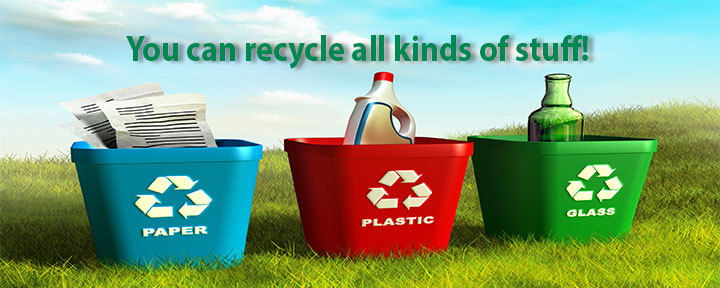
I consider myself a tree-hugger, and some call me a prepper. I try to make things from scratch, grow my veggies and fruit, and produce as little CO2/methane as possible. That’s why I was thrilled to see Green America’s list of 21 things that can be recycled or reused. They even include links and contact info.
Check it out:
1. Appliances: Goodwill accepts working appliances, or you can contact the Steel Recycling Institute to recycle them.
2. Batteries: Try Battery Solutions to buy a product to put batteries in to ship away. Staples also has a national battery recycling program for individuals or your office. Some Ikea stores have recycling stations for them as well.
3. Cardboard boxes: Contact local nonprofits and women’s shelters to see if they can use them. Or, offer up used cardboard boxes at your local Freecycle.org listserv or on Craigslist.org for others who may need them for moving or storage. If your workplace collects at least 100 boxes or more each month, UsedCardboardBoxes.com accepts them for resale.
4. CDs/DVDs/Game Disks: Send scratched music or computer CDs, DVDs, and PlayStation or Nintendo video game disks to CDFixers for refinishing, and they’ll work like new.
5. Clothes: Wearable clothes can go to your local Goodwill outlet or shelter. Donate wearable women’s business clothing to Dress for Success, which gives them to low-income women as they search for jobs. Offer unwearable clothes and towels to local animal boarding and shelter facilities, which often use them as pet bedding. Consider holding a clothes swap at your office, school, faith congregation or community center. Swap clothes with friends and colleagues, and save money on back-to-school clothes, Halloween costumes, or any season you want.
6. Compact fluorescent bulbs: Call your local Ikea store–many have units for recycling florescent bulbs, along with batteries and conventional recyclables. Earth911 has a great tool where you can enter your recyclable and zip code and it will give you a list of places that will accept that item.
7. Compostable bio-plastics: Compostable bioplastics include those cornstarch utensils and specially marked cups, which won’t break down quickly in your home compost bin like your food scraps do. Find a Composter has a tool for finding municipal composters for these types of items.
8. Computers and electronics: E-Stewards has a tool for finding responsible recyclers for computing waste which can be toxic and hard to break down.
9. Exercise videos: If you’ve done the same workouts a million times, swap them with others at Video Fitness. If you’re done with them forever, contact your closest e-waste station and see if they will accept them. Policies change frequently and the magnetic tape in VHS makes them particularly difficult to recycle.
10. Eyeglasses: Your local Lion’s Club or eye care chain may collect these. Lenses are reground and given to people in need. Often eye doctors’ offices will collect them, or even local libraries. Glasses are most often donated as-is to someone with a similar prescription. Reading glasses and non-prescription sunglasses can often be donated as well.
11. Foam packing: Your local pack-and-ship store will likely accept foam peanuts for reuse. Or, call the Plastic Loose Fill Producers Council to find a drop-off site. For places to drop off foam blocks for recycling, contact the Alliance of Foam Packaging Recyclers.
12. Ink/toner cartridges: Recycleplace.org will pay a few cents for your old ink cartridges, up to $1 depending on the brand. If you bring your old cartridges to Staples, they will give you a $2 voucher you can use towards your new ink. Also, Best Buy accepts ink cartridges, as they have a large recycling program.
13. Oil: When the oil is being changed in your car, it can be re-refined and made into motor lubricants and other petroleum products. Earth911 has a tool to find which auto shops you can use to recycle oil in your zip code.
14. Phones: HopeLine is a program to provide cell phones to domestic violence survivors. Bring them to a Verizon or mail them in to donate. Office phones and corded phones can be recycled through Staples or another e-waste recycler.
15. Sports equipment: Resell or trade it at your local Play It Again Sports outlet or at Goodwill.
16. “Technotrash”: Staples’ e-waste program will take iPods, MP3 players, cell phones and chargers, digital cameras, PDAs, palm pilots, and more. Also, easily recycle all of your CDs, jewel cases, DVDs, audio and video tapes, pagers, rechargeable and single-use batteries, PDAs, and ink/toner cartridges with GreenDisk’s Technotrash program. For $11.95, GreenDisk will send you a cardboard box (or you can use your own) in which you can ship them up to 25 pounds of any of the above. Your fee covers the box as well as shipping and recycling fees.
17. Athletic and other shoes: MORE takes donations of lightly used running shoes which are resold to fund sustainable farming programs. Soles4Souls was founded after Hurricane Katrina, which gives shoes as a measure of disaster relief and to create micro-enterprises with a low cost product.
